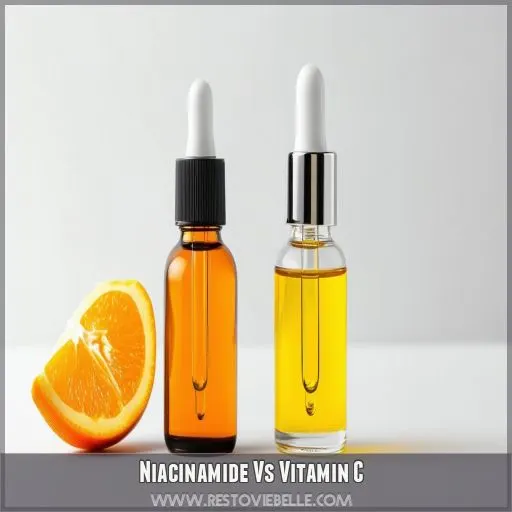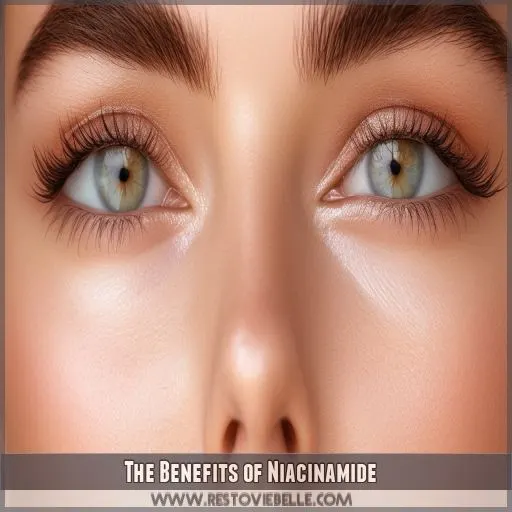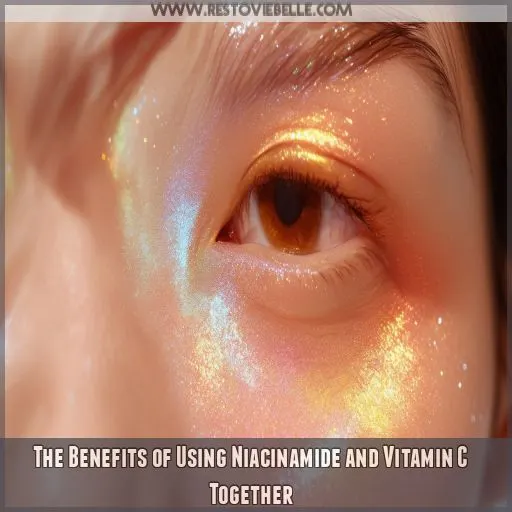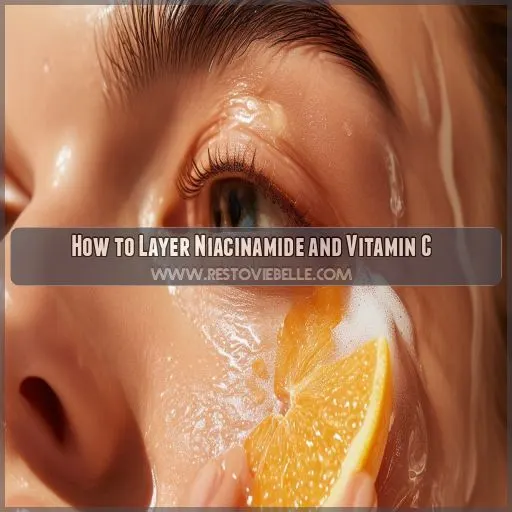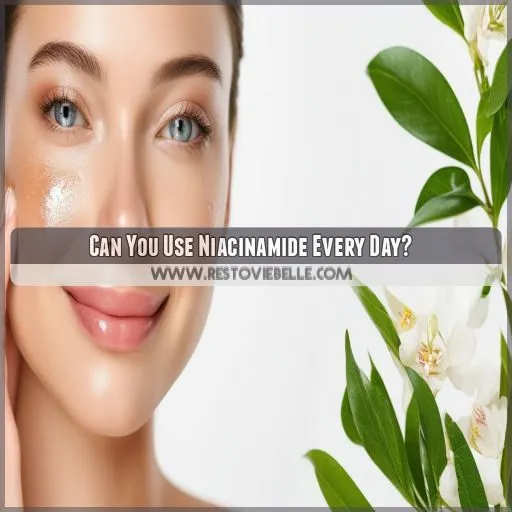This site is supported by our readers. We may earn a commission, at no cost to you, if you purchase through links.

These ingredients, when layered appropriately, work in harmony to boost antioxidant protection and address a multitude of skin concerns.
Uncover the secrets to mastering this art of layering, and discover effective solutions for issues like hyperpigmentation and premature aging.
Learn how to incorporate these into your daily routine for optimal results.
Table Of Contents
- Key Takeaways
- Can You Use Vitamin C and Niacinamide Together?
- Can You Use Niacinamide and Vitamin C Together?
- Niacinamide Vs Vitamin C
- The Benefits of Niacinamide
- The Benefits of Vitamin C
- The Benefits of Using Niacinamide and Vitamin C Together
- How to Layer Niacinamide and Vitamin C
- What is Niacinamide?
- Can You Use Niacinamide Every Day?
- What is Vitamin C?
- How to Use Vitamin C
- Frequently Asked Questions (FAQs)
- Why can’t you use vitamin C and niacinamide together?
- How long should I wait between applying vitamin C and niacinamide?
- What should you not mix with niacinamide?
- What should you not take vitamin C with?
- How long should I wait between applications?
- What happens if I use niacinamide and retinol together?
- Can I use niacinamide with other acids?
- Can I mix vitamin C with other serums?
- What should I do if I experience irritation?
- Conclusion
Key Takeaways
- Vitamin C and niacinamide create a dynamic duo, offering enhanced antioxidant protection and synergistically tackling multiple skin concerns.
- To master the art of layering, apply the Vitamin C serum first, followed by the niacinamide serum, allowing each ingredient to fully showcase their benefits.
- The combination of niacinamide and Vitamin C provides a holistic skincare approach, improving skin health, boosting collagen production, and effectively fighting free radicals.
- Incorporating niacinamide and Vitamin C into your daily routine can lead to optimal results in increased skin elasticity, reduced hyperpigmentation, and enhanced radiance.
Can You Use Vitamin C and Niacinamide Together?
Yes, you can use Vitamin C and niacinamide together.
These form a potent alliance in your skincare routine, addressing multiple skin concerns from distinct perspectives.
Vitamin C is a powerful antioxidant. It brightens your complexion, stimulates collagen production, and protects against environmental damage.
Niacinamide regulates sebum production, reduces redness, and strengthens your skin’s moisture barrier.
To maximize their benefits, begin by applying Vitamin C serum first, followed by the niacinamide serum.
These ingredients complement each other seamlessly.
Can You Use Niacinamide and Vitamin C Together?
Yes, you can use niacinamide and vitamin C together.
This combination offers a holistic approach to skin health, enhancing the individual benefits of each ingredient.
Niacinamide, a form of vitamin B3, neutralizes free radicals, strengthens the skin’s moisture barrier, regulates sebum production, reduces hyperpigmentation, and boosts collagen levels.
Vitamin C, a potent antioxidant, minimizes discoloration, stimulates collagen synthesis, controls oil production, and improves the appearance of acne scars.
When combined, these ingredients provide reinforced antioxidant protection, effectively addressing multiple skin concerns. They improve skin elasticity and enhance radiance, working synergistically to elevate your skincare routine.
To maximize their benefits through proper layering, apply vitamin C serum first and allow it to absorb. Then, apply the niacinamide serum. This sequential approach ensures both ingredients can fully express their advantages.
Niacinamide Vs Vitamin C
Now that you know you can use niacinamide and vitamin C together, let’s explore the unique benefits that each ingredient brings to your skincare routine.
Niacinamide, a form of vitamin B3, is like a multitasking master for your skin. It improves hydration, so your skin feels supple and smooth. Say goodbye to acne and redness because niacinamide is a pro at regulating oil production and calming inflammation. And if you’re concerned about aging, niacinamide boosts collagen production, giving you a youthful edge against fine lines and wrinkles.
On the other hand, vitamin C is a brightening superstar. It tackles hyperpigmentation and dark patches, revealing a radiant and even complexion. Vitamin C also stimulates collagen growth, so your skin feels firmer and bounces back like a boss. And let’s not forget its antioxidant powers, protecting your skin from environmental damage and giving you that healthy glow.
The Benefits of Niacinamide
Niacinamide neutralizes free radicals and strengthens your skin’s moisture barrier, helping to retain hydration. It also regulates sebum production, reducing hyperpigmentation and redness, and increases collagen levels, promoting elasticity and reducing fine lines.
Neutralizes Free Radicals
Niacinamide and vitamin C are a dynamic duo as far as neutralising free radicals and providing antioxidant protection for your skin. Free radicals, caused by sun damage and environmental stressors, can lead to premature ageing and skin damage. Here’s how niacinamide and vitamin C come to the rescue:
- Niacinamide neutralises free radicals, offering antioxidant protection and shielding your skin from environmental damage.
- Vitamin C, a powerful antioxidant, also neutralises free radicals, providing a protective barrier against pollution and UV radiation.
- When used together, they reinforce each other’s antioxidant effects, creating a stronger defence against free radical damage.
Strengthens Skin’s Moisture Barrier
Another benefit of niacinamide is its ability to strengthen your skin’s natural moisture barrier. This means your skin can better retain hydration, leading to a more supple and youthful complexion. It’s like giving your skin an extra layer of protection against the elements, helping to lock in that precious moisture.
| Niacinamide | Vitamin C | |
|---|---|---|
| Skin Barrier | Strengthens | N/A |
| Moisture Retention | Improves | N/A |
| Hydration | Enhances | N/A |
| Skin Protection | Provides | Offers |
| Skin Health | Promotes | Promotes |
Regulates Sebum Production
- Oil Control: Niacinamide is like a bouncer at the door of your oil glands, telling them to calm down and take a break. It’s especially helpful if you’ve got oily skin that constantly makes you look like you just ran a marathon.
- Sebum-Regulation: Your skin produces sebum, a natural oil that can sometimes go into overdrive, leading to clogged pores and acne. Niacinamide gently tells your skin, "Hey, ease up on the sebum production!"
- Inflammation-Reduction: Acne prone? Niacinamide’s got your back. It reduces the redness and inflammation that come with breakouts, so your skin can heal and you can feel more confident.
- Collagen-Production: As if that’s not enough, niacinamide also boosts collagen production. This means firmer, plumper skin that’s less likely to wrinkle over time.
Reduces Hyperpigmentation and Redness
Niacinamide is a redness-relieving superstar. It reduces the appearance of dark spots and evens out skin tone, addressing hyperpigmentation. It also calms inflammation, providing redness relief and promoting a more even complexion. This is particularly beneficial for those with sensitive skin prone to redness and irritation.
Increases Collagen Levels
Niacinamide, a form of vitamin B3, gives your skin a youthful boost. It does this by increasing collagen levels, which results in improved skin elasticity.
Your skin will feel firmer and look more radiant. By enhancing collagen synthesis, niacinamide reduces the appearance of fine lines and wrinkles.
This anti-aging effect is a significant benefit, giving you a more youthful complexion.
The Benefits of Vitamin C
Vitamin C is a potent antioxidant that protects your skin from environmental damage. It can also minimize discoloration, stimulate collagen growth, control oil production, and reduce the appearance of acne scars.
Potent Antioxidant
Vitamin C is a powerful antioxidant that does wonders for your skin. Here’s how:
- It neutralizes free radicals, protecting your skin from environmental damage caused by pollution and UV radiation.
- Vitamin C boosts collagen production, enhancing skin elasticity and reducing fine lines.
- It brightens your skin tone, reducing redness and hyperpigmentation for a clearer, more even complexion.
- This superhero vitamin also enhances skin hydration, so your skin looks and feels healthier.
Minimizes Discoloration and Dark Patches
Vitamin C is a brightening superstar, minimizing discoloration and dark patches for a more even skin tone. It’s like an eraser for those pesky hyperpigmentation marks, fading them away for a clearer, more radiant complexion. You can think of it as your skin’s personal eye mask, brightening and tightening those delicate areas.
Stimulates Collagen Growth
Vitamin C stimulates collagen growth, boosting your skin’s elasticity and making it look firmer and more youthful. It helps reduce wrinkles and fine lines, smoothing and enhancing your complexion. This is a key benefit of vitamin C, enhancing your skin’s appearance and health.
Controls Oil Production
Vitamin C helps control oil production, which is great news if you’re prone to breakouts. Here’s how:
- It regulates sebum (oil) production, so your skin stays balanced and healthy.
- By keeping oil levels in check, it helps prevent acne and other skin issues.
- This makes it a must-have for anyone with oily or acne-prone skin, offering a natural approach to clearer skin.
Reduces Appearance of Acne Scars
Vitamin C is a hero for skincare routines, especially when it comes to reducing the appearance of acne scars.
It’s like giving your skin a fresh start, helping to fade those reminders of past breakouts and promoting a clearer canvas.
Not only that, but Vitamin C also works to brighten dark spots and even out your complexion, giving you a radiant, confident glow.
The Benefits of Using Niacinamide and Vitamin C Together
Using niacinamide and vitamin C together provides enhanced antioxidant protection and tackles multiple skin concerns simultaneously. This combination addresses hyperpigmentation from different angles, offering a more thorough solution for brighter, healthier skin.
Reinforces Antioxidant Protection
When combined, niacinamide and vitamin C offer an antioxidant combination that reinforces the skin’s defence against free radical damage. This synergistic benefit provides enhanced skin protection and anti-aging effects, improving your complexion. This combination is a more holistic approach to skincare, tackling multiple concerns simultaneously.
Addresses Multiple Skin Concerns
Niacinamide and vitamin C are a dynamic duo in your skincare regimen. They address a multitude of skin concerns, offering synergy in your routine. By targeting different pathways, they provide a holistic solution to common skin issues.
Niacinamide strengthens your skin’s natural moisture barrier, locking in hydration. Vitamin C enhances skin hydration, so your skin looks and feels supple. These two ingredients work together to give your skin a radiant, dewy glow.
Tackles Hyperpigmentation From Different Angles
One of the most common skin concerns is uneven skin tone, which can be tackled by combining ingredients in your skincare routine. Niacinamide and vitamin C each have their own unique mechanisms for addressing hyperpigmentation:
- Niacinamide fights hyperpigmentation by reducing the appearance of dark spots and promoting a more even skin tone.
- Vitamin C brightens the skin and reduces hyperpigmentation, resulting in a clearer, more radiant complexion.
Provides a More Comprehensive Solution
When combined, niacinamide and vitamin C provide a comprehensive approach to skincare. They address various concerns, ranging from reducing hyperpigmentation to stimulating collagen production and combating free radicals. This powerful combination offers a complete solution for sensitive skin, pregnancy-related changes, and dry skin issues.
Niacinamide’s ability to strengthen the skin’s barrier and regulate oil production makes it a perfect complement to vitamin C’s brightening and collagen-boosting properties. This pairing ensures your skin isn’t only clearer and more radiant but also better protected and hydrated.
How to Layer Niacinamide and Vitamin C
To effectively layer niacinamide and vitamin C, start by applying the vitamin C serum first, allowing it to fully absorb. Then, follow with the niacinamide serum, ensuring each layer has time to penetrate the skin for the best results.
Apply Vitamin C Serum First
To maximise the benefits of both ingredients, you should apply your vitamin C serum first. This is because vitamin C has a less stable nature and needs time to absorb fully. Wait a minute or so to give your skin time to absorb the product. Then, you can move on to the next step in your skincare routine.
Apply Niacinamide Serum After
After applying your vitamin C serum, it’s time to move on to the next step in your skincare routine: applying your niacinamide serum. Here’s a simple guide to help you out:
- Wait Time Between Layers: Give your skin a minute or so to absorb the vitamin C serum before moving on to niacinamide. This ensures that each product has time to work effectively.
- Correct Application Order: Apply your niacinamide serum after your vitamin C serum. This is because vitamin C tends to have a less stable nature, so it’s best to give it a head start.
- Consistency Matters: As a general rule, always apply products from thinnest to thickest consistency. This ensures that each layer can properly absorb into your skin.
- Moisturize and Protect: Once you’ve applied your serums, finish off with a good moisturizer to lock in all that hydration. Don’t forget your sunscreen during the day, too!
Allow Skin to Absorb Each Layer
After applying your serums, allow your skin a moment to absorb each layer.
This is a critical step in your morning and evening skincare routine as it ensures your skin can fully benefit from the active ingredients.
This is especially important when using potent serums like vitamin C and niacinamide, which are suitable for all skin types and can address a multitude of skin concerns.
What is Niacinamide?
Niacinamide, also known as vitamin B3, is a gentle, multi-tasking skincare ingredient that can be used daily. It offers a range of benefits for the skin, including:
- Improving the skin’s barrier function, which helps retain moisture and reduces redness, leaving your skin feeling soft and supple.
- Fighting hyperpigmentation to reduce the appearance of dark spots and promote a more even skin tone.
- Regulating oil production to help treat acne and prevent future breakouts, giving you a clearer complexion.
- Boosting collagen production to enhance skin elasticity and reduce signs of premature aging, such as fine lines and wrinkles.
Can You Use Niacinamide Every Day?
Niacinamide is safe to use every day and can be incorporated into your daily skincare routine. It’s a tolerable and gentle ingredient that can be included in your morning and evening skincare regimen.
Niacinamide is a multi-purpose skincare ingredient that provides numerous benefits for all skin types, especially those with acne-prone, mature, or eczema-prone skin. It’s known to regulate sebum production, reduce inflammation and hyperpigmentation, strengthen the skin’s barrier, and promote skin hydration.
What is Vitamin C?
Vitamin C is a powerful antioxidant with multiple benefits for your skin. It’s like a superhero that protects your skin from environmental damage, brightens your complexion, and gives you a youthful glow. Vitamin C boosts collagen production, enhancing your skin’s elasticity and reducing those pesky fine lines and wrinkles. It’s like having your own personal skin tightener! But that’s not all—it also reduces redness and hyperpigmentation, giving you an even and radiant skin tone**. You can think of it as your skin’s personal colour corrector.
Now, let’s talk about where you can find this superhero nutrient. Vitamin C is naturally found in many fruits and vegetables, especially citrus fruits like oranges and lemons. You can also find it in strawberries, kiwis, peppers, and broccoli. Including these foods in your diet is a tasty way to boost your vitamin C intake. However, if you feel like your skin needs an extra boost, you can also opt for vitamin C supplements, which come in various forms like tablets, capsules, or powders.
How to Use Vitamin C
Vitamin C is a powerful tool in your skincare arsenal, but how do you use it? Here’s a step-by-step guide:
- Select a Small Test Area: Choose a small, easy-to-conceal area of skin, like your forearm. Apply a small amount of the product and wait 24 hours. If no side effects occur, you’re good to go!
- Cleanse: Start with a thorough cleanse of your face to remove any dirt, oil, or impurities.
- Tone: Using a toner is optional, but it can help prep your skin to better absorb the Vitamin C serum.
- Apply Vitamin C Serum: Now, apply your Vitamin C serum to your cleansed skin. You can do this once or twice a day, or even every eight hours for enhanced benefits.
- Moisturize: Finish off by applying a moisturizer to lock in all the goodness.
A few extra tips:
- Timing: Some recommend applying Vitamin C serum at night when your skin is in its natural repairing state. However, others suggest using it in the morning as a backup to your sunscreen.
- Sun Protection: Vitamin C products can make your skin prone to redness and sunburn, so always follow up with sunscreen during the day.
- Consistency: Results take time, so be patient! Long-term, diligent use of Vitamin C serum is key to seeing improvements in your skin’s brightness, texture, and overall appearance.
Frequently Asked Questions (FAQs)
Why can’t you use vitamin C and niacinamide together?
You can use vitamin C and niacinamide together. There’s a myth that they’re unsafe to combine, but it’s based on outdated research. Modern skincare formulas make it safe to use these ingredients together.
How long should I wait between applying vitamin C and niacinamide?
Better safe than sorry" – a relevant skincare idiom. It’s suggested to maintain a 15-minute gap between applying vitamin C and niacinamide.
What should you not mix with niacinamide?
You should avoid mixing niacinamide with vitamin C, retinol, and acidic skincare ingredients such as glycolic and salicylic acid.
What should you not take vitamin C with?
There are several medications that you shouldn’t take with vitamin C. These include nitrate medications, oral contraceptives, and chemotherapy drugs. It’s important to consult your doctor or oncologist before combining vitamin C with any other medication.
How long should I wait between applications?
It’s recommended to wait 15-30 minutes between applications of vitamin C and niacinamide. If you have sensitive skin, rinsing your face after applying vitamin C can help prevent flushing.
What happens if I use niacinamide and retinol together?
Niacinamide and retinol can be combined in one product or used separately. Niacinamide helps calm the skin, reducing irritation caused by retinol. This pairing can make retinol easier to use.
Can I use niacinamide with other acids?
Yes, you can use niacinamide with other acids like glycolic acid, hyaluronic acid, and alpha-hydroxy acid (AHA). However, you should be cautious and avoid using them simultaneously. Instead, use them at different times of the day or on alternating days.
Can I mix vitamin C with other serums?
A bird in the hand is worth two in the bush." Vitamin C serum can be used with other serums, as long as they don’t contain ingredients like AHAs and BHAs. It’s best to combine it with a hydrating serum with hyaluronic acid. When layering, apply the serum that addresses your primary skin concern first.
What should I do if I experience irritation?
If you experience irritation, stop using the product and consult a dermatologist before trying it again. If you have sensitive skin, consider using low concentrations of niacinamide, typically no greater than 2%.
Conclusion
Indeed, you can use vitamin C and niacinamide together in your skincare routine.
Doing so boosts antioxidant protection and addresses various skin concerns.
When layered appropriately, these ingredients work harmoniously.
This dynamic duo offers powerful synergy to enhance your skin’s health.


